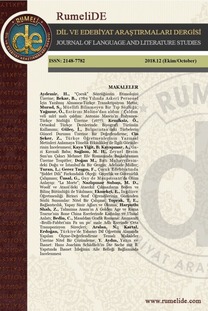Bilgisayar terminolojisinin kapsamı hakkında
Bilgi, yeni bilimsel alanlar, bilgisayar terminolojisinin uzantısı, bilgisayar terimlerinin sınıflandırılması
About the extent of informatics terminology
Information, new fields of science, extension of computer terminology, classification of computer terms,
___
- Акulinina, T.V. (2003). Ekstralinqvistitcheskaya obuslovlennost osobennostey angliyskoy terminologii kompyuternoy informatiki [Dissertatsiya na soiskaniye utchenoy stepeni kandidata filologitcheskikh nauk, Omskiy qosudarstvenniy tekhnitcheskiy universitet]
- [Акулинина, Т.В. (2003). Экстралингвистическая обусловленность особенностей английской терминологии компьютерной информатики [Диссертация на соиск. уч. степени канд. филол. наук, Омский государственный технический университет]].
- Azerbaydjan Merkezi Banki. (2016). Informasiya Tekhnologiyaları Standarti [Azərbaycan Mərkəzi Bankı. (2016). İnformasiya Texnologiyaları Standartı]. http://aba.az/wp-content/uploads/2016/03/Informasiya_texnologiyalari_standarti.pdf
- Balima, S.T. (2004). Une ou des « sociétés de l’information » ? Hermès, La Revue, 3 (N 40), 205-209.https://www.cairn.info/revue-hermes-la-revue-2004-3-page-205.htm
- Bardy, L. (2006, Septembre). L’informatique, partie intégrante de la culture générale de l’homme moderne ? Interface, le bulletin de la Société suisse pour l'informatique dans l'enseignement (SSIE). https://www.epi.asso.fr/revue/articles/a1002g.htm
- Boulanger, J.-C. (1988, 9-13 mai). Remarques sur l’aménagement du statut du français en İnformatique [communication]. Le 56e Congrès de l’ACFAS, Moncton, Canada http://boulanger.recherche.usherbrooke.ca/document-article- boulanger_1989e
- Chalneva,V.A. (2016). Ranniye etapi formirovaniya terminosistemi informatsionnikh tekhnologiy. Vestnik Voronejskoqo qosudarstvennoqo universiteta. Seriya: Linqvistika i mejkulturnaya kommunikasiya, N 4, 61-65
- [Шальнева, В.А. (2016). Ранние этапы формирования терминосистемы информационных технологий. Вестник Воронежского государственного университета. Серия: Лингвистика и межкультурная коммуниуация, N 4, с. 61-65]. file:///C:/Users/User/Downloads/rannie-etap-formirovaniya-terminosistem-informatsionn-h-tehnologiy.pdf
- Daoud, A. et Jarraya, H. (2018). La société d’information : enjeux et tendances. https://lte.ma/la-societe-de-linformation-enjeux-et-tendances
- Dessus,Ph. (2008, Juillet-Septembre). Qu’est-ce que l’enseignement ? Quelques conditions nécessaires et suffisantes de cette activité. Revue française de pédagogie, 164, 139-158 https://doi.org/10.4000/rfp.2098 file:///C:/Users/User/Downloads/rfp-2098%20(1).pdf, 1-25
- Dictionnaire informatique anglais-français Reverso. (2007)https://dictionnaire.reverso.net/informatique-anglais-francais/
- Djalallı, I. (2017). Informatika terminlerinin izahlı lugeti ingilisdje-rusdja-turkdje-azerbaydjandja. “Informasiya Texnologiyalari nechriyyati”. [Calallı, İ. (2017). İnformatika terminlərinin izahlı lüğəti-ingiliscə-rusca-türkcə-azərbaycanca. “İnformasiya Texnologiyaları nəşriyyatı”].
- Filippovitch, Y. N. (2002). Metafori informatsionnikh tekhnologiy: rabotchiye materialı issledovaniya kopyuternikh jurnalov. Moskva: Qos. Un-t petchati. [Филиппович, Ю. Н. (2002). Метафоры информационных технологий: рабочие материалы исследования компьютерных журналов. Москва: Гос. Ун-т печати].
- Martini, L. (2019). L’évolution d’Internet. https://www.supinfo.com/articles/single/5256-evolution-internet
- Microsoft Education. (2020). https://www.microsoft.com/fr-fr/education .......................
- Microsoft Teams pour l’Education. (s.d.). https://edudownloads.azureedge.net/msdownloads/MicrosoftTeamsforEducation QuickGuide_FR-FR.pdf
- Mirabail, M. (s.d.) La culture informatique, 11-28. https://core.ac.uk/download/pdf/15490673.pdf..............
- Mirzebeyli, I. (2018, 21 août). Azerbaydjan brendleri: “ASAN”, “MIDA”, “ABAD” və “DOST”. [Mirzəbəyli, İ. (2018). Azərbaycan brendləri: “ASAN”, “MİDA”, “ABAD” və “DOST”]. http://xalqqazeti.com/az/news/1565
- Quéré, L. (2000). Au juste, qu`est-ce que l’information ? Réseaux. Communication – Technologie – Société. N 100. CENT/Hermès Science Publications, 331-357. https://www.persee.fr/doc/reso_0751-7971_2000_num_18_100_2227
- Reboul-Touré, S. (2005). Les mots et l’internet. Linx Revue des linguistes de l’Université Paris Ouest Nanterre : Lexique, terminologie, discours, 52, 193-203.file:///C:/Users/User/Downloads/linx-237%20(1).pdfr
- Sultanov, A. (2019, 4 novembre). Qlobal Internet chebekesi: formalachmasi, muasir durumu ve geledjeyi. [Sultanov, Ə. (2019). Qlobal İnternet şəbəkəsi: formalaşması, müasir durumu və gələcəyi]. https://azadinform.az/az/elmtehsil/239654/qlobal-internet-sebekesi-formalasmasi-muasir-durumu-ve-geleceyi/
- Yankauskas, К. (2018, 16 février). ASAN i ABAD otchen khorochiye brendi Azerbaydja. [Янкаускас, К. (2018). ASAN и ABAD очень хорошие бренды Азербайджана].https://www.salamnews.org/ru/news/read/304330
- ISSN: 2148-7782
- Yayın Aralığı: 6
- Başlangıç: 2014
- Yayıncı: Yakup YILMAZ
Rus kültüründe anahtar kavram olarak ekmek
Hasan CANKAT ÇAĞIL, Tatiana Antonovna YAŞENKO
Türk kahvesinin ve kahvehanelerin öneminin İngiliz ve Osmanlı kültüründe karşilaştirmali analizi
Friedrich Dürrenmatt’ın“Yemin“ başlıklı eserinde olayın tesadüfle çözülmesi
Bilgisayar terminolojisinin kapsamı hakkında
Söylemsel yöntemler üzerine bir çözümleme: Koronavirüs içerikli bir metin örneği
